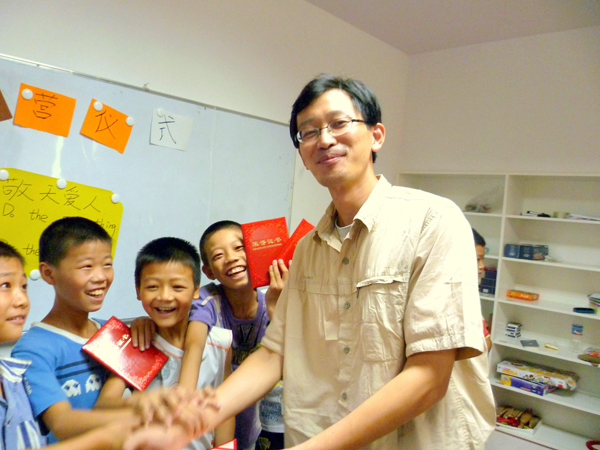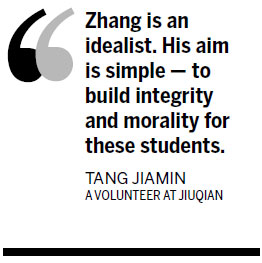Catalyst of change
Updated: 2013-07-09 15:47
By Wu Ni (China Daily)
|
||||||||
 |
|
Zhang Yichao with migrant students at Jiuqian Voluntary Center in Shanghai. Provided to China Daily |
Zhang Yichao has a noble aim. Through his voluntary education center, he hopes to have a positive impact on the lives of migrant workers' children. He shares his dreams with Wu Ni in Shanghai.
Although widely praised as a volunteer dedicated to helping migrant children, Zhang Yichao, founder of Jiuqian Voluntary Center that provides free extracurricular education for migrant students, prefers to be called an educator - the kind that "enlightens young minds and encourages their self-awakening".

The 36-year-old Shanghai native established Jiuqian - which means hand-in-hand forever - in 2002, when he was a philosophy postgraduate at Fudan University. The center was formally registered as a nonprofit organization in 2008, with about 40 volunteer teachers giving classes related to painting, singing, and violin, as well as organizing various social activities.
Learning art, music and other skills beyond ordinary curriculum, Zhang says, is an important enlightenment for these migrant students, whose parents have left their rural homes to toil in big cities to earn a living.
At first glance one cannot tell the difference between these migrant students and any other teenagers.
Dozens of students sit randomly on the floor in the cozy classroom, surrounded by bookshelves, CD-shelves, a zither and a dulcimer. They are all neatly dressed and some have their smart phones with them.
Zhang teaches the Theory of Knowledge, a lesson that encourages students to discuss and debate open-ended issues such as whether human history is moving forward or repeating itself.

Like a mentor tutoring his disciples, Zhang, sitting in the center, gives brief comments on the views of students, ensures everyone has the chance to speak and calms over-heated debate.
"My goal is to activate their mind," he says, "as most Chinese students their age are overwhelmed with various exams. They dare not challenge authority, nor reflect on their life. But they have the chance to make up for this in universities by reading books or communicating with teachers.
"Many migrant workers' children, however, are hustled to work to share the family burden as soon as they graduate from middle school. They never have the chance to see how rich and colorful life can be."
At Jiuqian, migrant students can choose any course and come once or twice a week. But if they don't take the course seriously, Jiuqian will shut its door.

 'Despicable' minions upset Depp's 'Lone Ranger' at box office
'Despicable' minions upset Depp's 'Lone Ranger' at box office
 'Taken 2' grabs movie box office crown
'Taken 2' grabs movie box office crown
 Rihanna's 'Diamonds' tops UK pop chart
Rihanna's 'Diamonds' tops UK pop chart
 Fans get look at vintage Rolling Stones
Fans get look at vintage Rolling Stones
 Celebrities attend Power of Women event
Celebrities attend Power of Women event
 Ang Lee breaks 'every rule' to make unlikely new Life of Pi film
Ang Lee breaks 'every rule' to make unlikely new Life of Pi film
 Rihanna almost thrown out of nightclub
Rihanna almost thrown out of nightclub
 'Dark Knight' wins weekend box office
'Dark Knight' wins weekend box office
Most Viewed
Editor's Picks

|

|

|

|

|

|
Today's Top News
China improves maritime law enforcement
Air crash victims' families arrive in SF
Hopes are high for US, China talks
Laden's life on the run revealed
US mulls hastening withdrawal from Afghanistan
China's inflation grows 2.7% in June
Country singer Randy Travis in critical condition
Police look for suspects in Brazil soccer slaying
US Weekly

|

|








